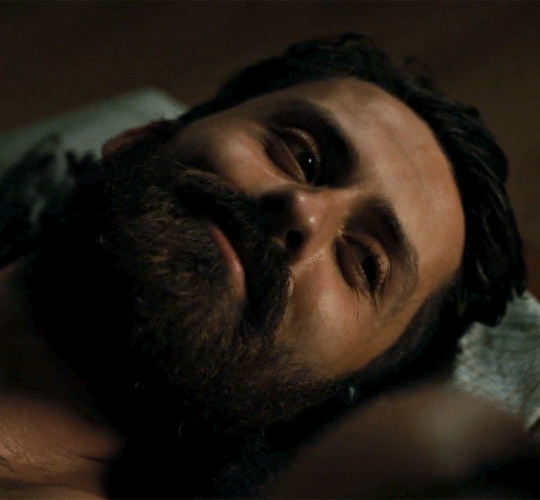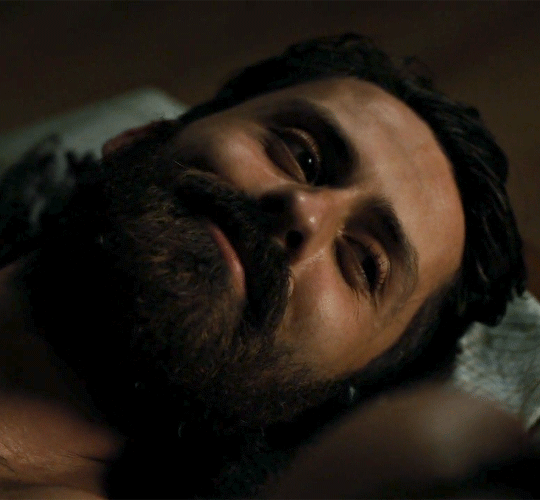#ch: hugo raymond.
Text


ANDY BEAN as HENRY in HERE AND NOW
#andy bean#abeanedit#andybeanedit#mancandykings#mensource#tvgifs#here and now#*#fc: andy bean#opp: stanley uris.#ch: freddie grimaldi.#ch: archie jackson.#ch: hugo raymond.
57 notes
·
View notes
Text


#ch: hugo raymond.#fc: andy bean#ooc: wanted opposite.#res: freddie grimaldi.#res: archie jackson.#opp: stanley uris.#the most underrated man i swear x#look @ his face gosh
1 note
·
View note
Text
Can the BBC’s Les Misérables do justice to Victor Hugo’s epic novel?
Few who love Les Mis the musical have read its source: a 1,500-page Victor Hugo novel. As the BBC tackles the book, David Bellos explains why it’s such a popular text to adapt.
The Sunday Times, December 16 2018, 12:01am
At dawn on June 19, 1815, in a muddy Belgian field where Napoleon has just lost his last battle, a scavenger filches the watch and purse of a dying soldier; a few weeks later, a long-term inmate of Toulon jail is released with a yellow passport and 109 francs. That’s where interlocking stories of Les Misérables begin, with Thénardier robbing the father of Marius, and Valjean setting off towards Digne.
If you think the magic of Les Mis comes mainly from the operatic version by Boublil and Schönberg, wait until you see the new adaptation by Andrew Davies, drawn from the book and not, like Tom Hooper’s 2012 film, from the musical, which leaves out most of Hugo’s novel’s story and doesn’t even mention the Battle of Waterloo. Davies’s script begins at the beginning, and the director, Tom Shankland, makes a truly memorable opener out of it.
Any adaptation of Les Misérables stands in a global tradition of spin-offs in every medium. In the cinema alone, there are about 70 full-length Misérables, in languages as varied as Russian, Farsi and Arabic. In Japan, there has been an independent strain of Mis-mania, expressed in manga and animé, for 100 years.
It’s not hard to see why Les Misérables is so much more attractive to dramatists than any other novel of the 19th century. Despite long passages of historical and philosophical discussion, Hugo’s saga of the poor has a simple narrative arc. It tells the redemptive life story of the former convict Valjean, from his release at Toulon to his death in Paris 20 years later. And, despite the sufferings that fill its pages, it is an optimistic story of how a man from the bottom of the pile may aspire to goodness and achieve it through persistence and sacrifice (plus the kind of luck that novels can invent). That’s dramatic enough.
Hugo was also a dramatist of genius. He created grand scenes ready for staging. The candlestick episode at Digne; the courtroom in Arras, where Valjean gives himself up to save an innocent man; the hold-up in Boulevard de l’Hôpital and Valjean’s escape from it; and the opening vision of a vulture-like thief robbing a dead man the morning after the greatest battle ever fought. Nearly all these great scenes feature a hero, part Hercules, part Christ, who defines himself through actions, not through thoughts and words. In fact, Valjean hardly says a word to himself, and not many to other people, either.
This leaves adapters and directors free to create their own image of this mythical figure. We’ve had a Valjean who looks like a tramp (the rough-hewn Harry Baur in Raymond Bernard’s 1934 film) and one who looks like a banker (in the Japanese TV serial), alongside handsome young men (Fredric March, Liam Neeson) and an action-movie star (Jean-Paul Belmondo) who had trouble pretending to be the right age. What we’ve not had is a Valjean who looks like Hugo: a short, broad-shouldered man in late middle age, in remarkably good physical shape. Despite being too tall, Dominic West, in this new TV version, comes closer than most. Les Misérables is not autobiographical (Hugo never went to prison, got buried alive or went down the sewers), but the writer’s moral self-identification with the suffering hero is one of the fundamental strengths of his book.
It was destined for the stage from the start. Even before the last volumes went on sale in July 1862, Charles Hugo, the writer’s son, began drafting a stage spectacular. A script doctor was hired to get it into shape for its premiere in Brussels in January 1863. It still flopped. But, published as a book, it influenced adaptations as to what to cut and keep.
The addition of music also has roots older than the West End musical version. Almost as soon as the first American translation of the novel appeared, a dramatist called Albert Cassedy dashed off Fantine, or The Fate of a Grisette, a popular opera with a score by Charles Koppitz. Music also plays an overlooked role in the novel: the tune Cosette practises on her piano- organ and the songs sung by schoolgirls in the Champs-Elysées, by convicts on tumbrils, by students in restaurants, hummed by a hunter in the woods and shouted out by an urchin on his way to the barricade, make up a concert programme of popular music in 19th-century France. It’s time to dust these off and perform them as the music Hugo had in his head.
Britain has had an unhappy relationship with Hugo’s epic tale because its authorised translation, by a retired military gentleman with his own views about what happened at Waterloo, was a complete disaster. For legal reasons, no new version could be brought out for decades thereafter. It didn’t help that the translation was available only in a costly hardback format.
Les Misérables reached its real audience in Britain through stage plays, and it’s amazing to see just how many there were: Charity, by CH Hazlewood, “founded on Victor Hugo’s story of Les Misérables”, was performed in London in November 1862; then came Jean Valjean, by Harry Seymour, Clarance Holt’s Out of Evil Cometh Good, in 1867, and many more. They concentrated heavily on Part I of Hugo’s five-part novel. The battle scene at Waterloo in Part II and the “revolutionary” stories of Parts IV and V seem to have been ignored most of the time.
In Russia, too, Tolstoy’s retelling of Les Misérables in simple language focused on Bishop Myriel’s charitable gift of silver to a rough customer. It was this fable-like episode, transposed into English by Norman McKinnel as The Bishop’s Candlesticks in 1908, that was turned into a silent short film by Herbert Brenon in 1913, which was then remade with a soundtrack in 1929. It never stopped, leaving Andrew Davies with a rich inheritance to renew — and to overturn. But he keeps one of the glitches that early translators made and that all Hollywood movie versions retain: he has Valjean steal the bishop’s silver cutlery, whereas in the novel he steals his silver plates (the French word “couvert” having changed its meaning).
One reason why Les Misérables has been remade in so many languages and periods is sex, or, more precisely, its total absence. It wasn’t prudery that kept Hugo off the topic. (He had plenty of experience, to put it politely.) But Les Misérables is about justice, social morality, crime, punishment, the meaning of history and the full potential of human life.
It’s true that old Gillenormand boasts of his past as a rake, but at 90 years of age, he’s long past acting out. It’s also true that Fantine becomes a prostitute — but Hugo deals with the episode in just seven words. Adaptations that put sex into the story express not what Hugo wrote about, but what some audiences are expected to find alluring.
On the other hand, a belief in the existence of a god is integral to the book’s meaning. Deeply sceptical of the Catholic church, Hugo omits Christian artefacts and rituals (including midnight Mass at Montfermeil and the church wedding of Cosette and Marius) to a degree that is almost comical in a panorama of 19th-century life, but he insisted that Les Misérables was a religious work. The prismatic glint of sunlight through foliage that Shankland deploys in the new BBC version, to show the start of Valjean’s conversion after robbing Petit-Gervais, seems to me an intelligent and respectful way of hinting at what Hugo meant.
One of the more puzzling aspects of Les Misérables and its flourishing international afterlife is its exclusive focus on France. There’s not a single foreigner among the 120 named characters in the novel; barring occasional remarks about London, Poland and the United States, Les Misérables talks exclusively about the history, politics, social structure and social ills of the country that Hugo considered to be top nation for all time, namely his own.
Though largely written in Guernsey and initially published in Belgium, the book was written for the French by a man whose long exile had no foreseeable end. Its first translator into Italian requested permission to cut historical passages because “there are some Italians, rather a lot in fact, who say: ‘This book, Les Misérables, is a French book. It is not about us. Let the French read it as history, let us read it as a novel.’”
Permission was refused. The intensity and completeness of this exposition of the social ills in 19th-century France effectively turned that now mythical place into a stand-in for the whole world. You can’t blame Hugo for not being in tune with 21st-century ideas of the politically correct, but you have to admire him for standing outside the conventions of his day.
His response to the translator has a prophetic sense, and answers in advance the question of why his French-focused masterpiece continues to attract readers, fans and adapters all over the world: “I do not know whether [my book] will be read by all, but I wrote it for everyone... Social problems go beyond borders. The sores of the human race, these running sores that cover the globe, don’t stop at red or blue lines drawn on the map. Wherever men are ignorant and desperate, wherever women sell themselves for bread, wherever children suffer for want of instruction or a warm hearth, Les Misérables knocks on the door and says, ‘Open up, I have come for you.’”
David Bellos is the author of The Novel of the Century: The Extraordinary Adventure of Les Misérables (Penguin £10.99). Les Misérables starts on BBC1 on Dec 30 at 9pm; Dominic West is interviewed in the Magazine next Sunday
‘The Glums’: a potted history
● The full text of Les Misérables in the right order of reading was not available to British readers until 2008, in a version by the Australian writer Julie Rose.
● In 1897, the Lumière brothers shot a one-minute reel of a quick-change artist masquerading as Hugo, Valjean, Thénardier, Marius and Javert. This was the first time fiction had ever appeared on celluloid film.
● Victor Hugo’s wife, Adèle, operated as publicity manager for the novel’s launch. She created a poster campaign featuring illustrations of the main characters, making the novel’s imminent appearance known long before its publication. Nothing like that had been done before. She also had announcements prepared for newspapers and requested that they were held back from publication until she gave the signal, making Les Misérables probably the first work launched under embargo.
● When Hugo was ready to publish Les Misérables in 1862, he secured the publishing deal of all time: in today’s terms, he was paid about £3m as an advance on a contract allowing the publisher Albert Lacroix to print the book for just eight years. Lacroix had to get a huge bank loan to finance the book.
● Charles Dickens met Hugo in Paris in 1847, visiting his splendid apartment on Place Royale. There is not a trace of the event in Hugo’s records, which suggests the British author didn’t make a strong impression on the literary star of his day. In Dickens’s eyes, though, Hugo looked “like the Genius he was”.
● Hugo’s contemporaries weren’t all taken with his novel: “This book is written for catholico-socialist shitheads and for the philosophico-evangelical ratpack,” Gustave Flaubert wrote to a friend.
● When Hugo fled France in 1851, both his sons were in prison and Louis-Napoléon — Napoléon III — was his sworn enemy. “Because we had Napoléon le Grand, do we have to have Napoléon le Petit?” he quipped.
● Les Misérables has been adapted for radio and cinema more times than any other novel.
● Classical literary French had a restricted vocabulary. Racine got by with about 2,000 words. Hugo uses about 20,000 different words in the 630,000 words of the text of Les Misérables — maybe as many as in all of Shakespeare working in English, which has a much larger vocabulary in the first place.
https://www.thetimes.co.uk/magazine/culture/can-the-bbcs-les-miserables-do-justice-to-victor-hugos-epic-novel-50wtqgvdj?t=ie
49 notes
·
View notes